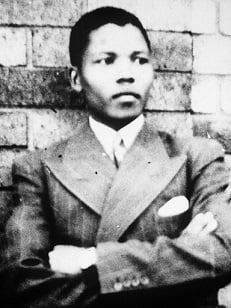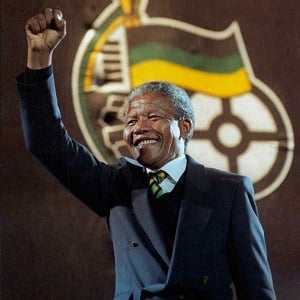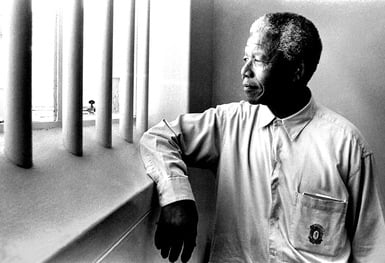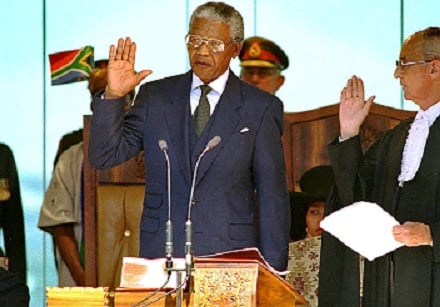 |
| Nelson Mandela at young age. (http://www.keywordsuggests.com/D7f7Qc0*e0QkrLW4Asa ()) |
"What I will remember most about Mr. Mandela is that he was a man whose heart, soul, and spirit could not be contained or restrained by racial and economic injustices, metal bars, or the burden of hate and revenge. He taught us forgiveness on a grand scale"- Muhammad Ali. Muhammad Ali's quote exemplifies the journey that a compassionate man named Nelson Mandela traveled in order to end the racial segregation in South Africa. Mandela was born on July 18, 1918 in Transkei, South Africa. He grew up in a small rural area where he attended boarding school and eventually obtained his law degree at the University of Witwatersrand. In addition to practicing law, Mandela joined the African National Congress (ANC) and later became Deputy President of the organization. Although apartheid was prevalent during this time, Mandela stood firm on his beliefs and eventually was able to unite the divided country. He was one of the most forgiving, and persevering individuals that ever lived because he dedicated his life to freeing oppressed South Africans in times of racial segregation.
 |
| Mandela giving speech at African National Congress (http://www.dnaindia.com/world/report-nelson-mandel ()) |
Even though Mandela and his people were mistreated by the whites, they never sought revenge. While in prison, Mandela never disrespected the white guards because he understood that they were simply doing their job. In addition, his beliefs on peace, humility, and treating others with respect was the fundamental foundation on how people should live their lives irrespective of gender, race, or religion. Other prisoners would later describe how, a few years into his incarceration, guards ordered him to dig and then climb into a grave-shaped trench in the prison yard. Mr. Mandela must have wondered whether this was the end. Then, as he lay in the dirt, they unzipped their trousers and urinated on him. Many years later, an aid asked Mr. Mandela to provide a list of people he wished to invite to his inauguration dinner as president of South Africa. The great figures of the liberation struggle would be there, of course, but the sole name on which Mr. Mandela is said to have insisted was that of a former jailer (Nolen). As seen in this radical mistreatment of Mandela's dignity, there was a great reason why he should have been upset or would never have wanted to associate himself with those guards. Mandela took a brave and resilient step into doing what he did which clearly showed that his mind was set on not being bitter of his mistreatment. Instead, he took this as an opportunity to be the better person. In an individual's life, it is inevitable that we will experience a form of humiliation but not to the extent of what Mandela endured. It can be seen that through the actions of Mandela, he was brave enough to rise above the horrible mistreatment of his race and he was able to make amends, as if nothing ever happened. Although the whites beat and killed some of Mandela's people, he never turned to violence while protesting. Even now, I can hardly believe that after living in a cell for nearly three decades, he is unscathed by bitterness. He is heralded as a legend around the world because of his brave stand for freedom, yet what's even more amazing is that he allowed none of the indignities he withstood to turn his heart cold. He could have become vengeful-easily. ("O- The Oprah Magazine") As seen in many other parts of the world, when oppressed groups rise to power after being mistreated, they abuse their privileges and seek revenge on those who harmed them. Mandela was the exception to this pattern in that he looked past the injustices that his oppressor bestowed upon him. If he had treated the whites the same way they treated his people, the blood bath would have continued. This would have eliminated any hope for the country. Mandela and his people were treated miserably but he never mistreated their enemies. Instead, he decided to be forgiving and not fight back with violence.
 |
| Mandela in his prison cell. (http://www.pbs.org/newshour/rundown/nelson-mandela ()) |
Mandela's perseverance to help free his people created a united and strong African community. While imprisoned, the metal bars that caged Mandela did not stop him from persevering in the hopes of freeing his nation. Nelson Mandela (1918-2013) spent a lifetime fighting for the rights of black South Africans and oppressed people throughout the world. A political prisoner in his native South Africa for nearly 27 years, Mandela became the human embodiment of the struggle against government-mandated discrimination. His courage and determination through decades of imprisonment galvanized not only South African blacks, but also concerned citizens on every continent ("Nelson Mandela."Contemporary). This evidence illustrates that even though Mandela was imprisoned for nearly three decades, he never faltered in his beliefs of freeing his people. The fact that he never gave up through the ferociously hard years in imprisonment and the abuse and violence he faced, clearly shows that he was not ready to give up. Mandela immersed his heart and soul into the movement as he could have easily given up. He became the figurehead of the anti-apartheid movement in that he did not resort to violence and he cooperated peacefully. Mandela's efforts accelerated the end of apartheid as many of the world leaders recognized and supported his cause for freedom. After Mandela's historic release, he ran for president and won. During his presidency, he continued to persevere by not only ending the apartheid but also working tirelessly on restoring peace in South Africa between the blacks and whites. President F.W. de Clerk announced the imminent release of Nelson Mandela. The next day Mandela met the press and told the world the following: Today, the majority of South Africans, blacks and whites, recognize that apartheid has no future. It has to be ended by own decisive mass action in order to build peace and security (Crompton). Immediately after his release, the first thing that Mandela spoke passionately about was to end the apartheid. This shows that the immediate reform he wanted to implement was to unite everyone in his South Africa. Merely saying that he would end apartheid and the country will become one, does not change the minds of many oppressors who still discriminated against blacks. Even after all of Mandela's sacrifices, during his tenure in the government, he did not demand immediate change as he knew that it would have to be a gradual transition. Mandela's determination in his beliefs from a young age until he became the leader of South Africa shows that one can achieve if one has patience.
 |
| Mandela's inaugural speech. (http://framework.latimes.com ()) |
Mandela's efforts and capacity for forgiveness was the stepping stone to removing apartheid and eventually uniting blacks and whites in South Africa. During this time, black South Africans were treated unjustly due to the racial segregation and discrimination. It is Mandela who stood up to the challenge of fighting for his people and leading them to a free South Africa. The key component to his success was through his forgiveness. Irrespective of the fact that he became president and had the power to avenge his enemies, he taught his people and the world "that revenge is not the answer to years of injustice". To be able to forgive after spending twenty seven years in prison exemplifies his compassion and generosity. It is through this ability of forgiveness that enabled Mandela to persevere and continue to fight for his beliefs. Throughout his journey, Mandela never allowed the abuse and humiliation prevent him from attaining his ultimate goal. A hero is someone who is a man of distinguished courage or ability admired for his brave deeds and noble qualities. Mandela fits this exact definition because he led his people with patience and wisdom and ultimately triumphed by bringing together a segregated country without violence. This was applauded not only in South Africa but in the entire world. Today many people throughout the world remember and honor Mandela for not just ending the apartheid and bringing peace to his country, but also the moral lessons that he taught the world of forgiveness and perseverance. Crompton, Samuel Willard. Nelson Mandela: Ending Apartheid in South Africa. New York, Chelsea House, 2007. "Nelson Mandela." Contemporary Black Biography, vol. 77, Gale, 2010. Biography in Context, link.galegroup.com/apps/doc/K1606004574/BIC1?u=powa9245&xid=abf0cfa9. Accessed 27 Apr. 2017. Nolen, Stephanie. "Mandela's Miraculous Capacity for Forgiveness a Carefully Calibrated Strategy." The Globe and Mail, Johannesburg - The Globe and Mail, 7 Dec. 2013, www.theglobeandmail.com/news/world/nelson-mandela/mandelas-miraculous-capacity-for-forgiveness-a-carefully-calibrated-strategy/article548192/?page=all. Accessed 15 May 2017. "Oprah Talks to Nelson Mandela." Pardon Our Interruption, 2001, www.oprah.com/world/Oprah-Interviews-Nelson-Mandela. Accessed 14 May 2017.Works Cited
Page created on 5/22/2017 12:00:00 AM
Last edited 5/22/2017 12:00:00 AM
